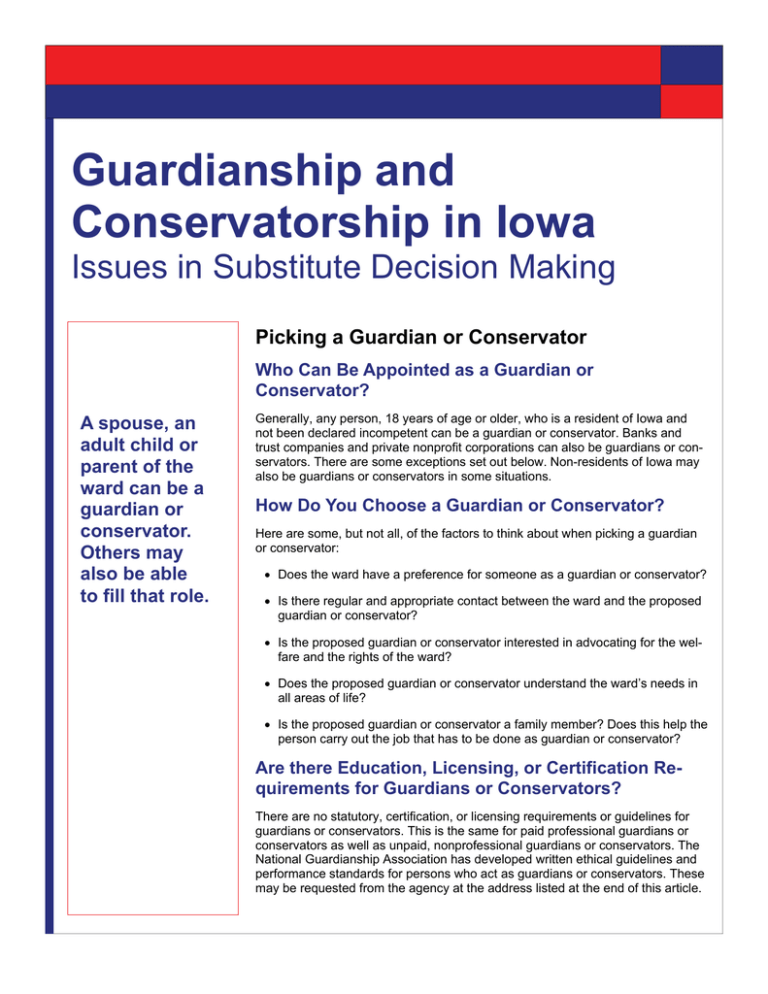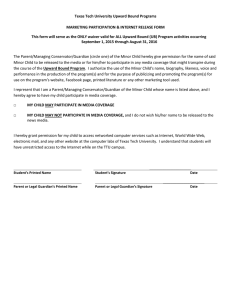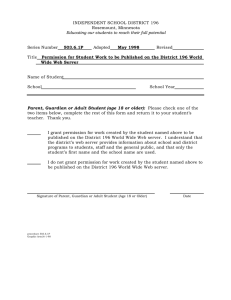Picking a Guardian or Conservator
advertisement

Guardianship and Conservatorship in Iowa Issues in Substitute Decision Making Picking a Guardian or Conservator Who Can Be Appointed as a Guardian or Conservator? A spouse, an adult child or parent of the ward can be a guardian or conservator. Others may also be able to fill that role. Generally, any person, 18 years of age or older, who is a resident of Iowa and not been declared incompetent can be a guardian or conservator. Banks and trust companies and private nonprofit corporations can also be guardians or conservators. There are some exceptions set out below. Non-residents of Iowa may also be guardians or conservators in some situations. How Do You Choose a Guardian or Conservator? Here are some, but not all, of the factors to think about when picking a guardian or conservator: Does the ward have a preference for someone as a guardian or conservator? Is there regular and appropriate contact between the ward and the proposed guardian or conservator? Is the proposed guardian or conservator interested in advocating for the welfare and the rights of the ward? Does the proposed guardian or conservator understand the ward’s needs in all areas of life? Is the proposed guardian or conservator a family member? Does this help the person carry out the job that has to be done as guardian or conservator? Are there Education, Licensing, or Certification Requirements for Guardians or Conservators? There are no statutory, certification, or licensing requirements or guidelines for guardians or conservators. This is the same for paid professional guardians or conservators as well as unpaid, nonprofessional guardians or conservators. The National Guardianship Association has developed written ethical guidelines and performance standards for persons who act as guardians or conservators. These may be requested from the agency at the address listed at the end of this article. Can More than One Guardian or Conservator be Appointed? Co-guardians or co-conservators can be appointed. There is no statutory limit on the number of guardians or conservators who may be appointed for a person. It is recommended that no more than two co-guardians or co-conservators be appointed. Generally, both conservators or guardians will have to agree on an action. However, the court can direct that decisions be made by one or the other of the guardians or conservators. For practical purposes and ease in decision making, naming one guardian and one conservator is best. Must the Guardian or Conservator and Ward Live in the Same City or State? The guardian or conservator should live in Iowa. He or she must be able to know about the ward’s physical and mental status and needs. The guardian or conservator must be available to carry out all the powers and duties granted to him/her by the court. The court can allow an out-of-state guardian or conservator for good cause or if a resident of Iowa is also appointed. It can be very difficult to live far away from the ward and be able to carry out all responsibilities. An example of when to consider asking the court for a co-guardian or co-conservator is when one of the proposed guardians or conservators lives out of state or far away from the ward. The person living farther away could share the responsibilities with another person who lives closer. Can a Person’s Licensed Service Provider be Appointed Guardian or Conservator? Sometimes the person who is willing to act as the guardian or conservator is also the proposed ward’s licensed service provider. At times, this may not work well for the ward. There is a significant potential for conflict of interest when a licensed service provider also acts as guardian or conservator for the same person. A guardian or conservator makes decisions which are in the best interest of the ward. A service provider makes decisions which should benefit the client, but also benefit the service provider. When the same person is making the decisions in both of these roles, there may be a difference between what is best for the ward and what is best for the service provider. Sometimes the law does not allow a service provider to be a guardian or conservator. Because of this potential for problems and a conflict of interest, a licensed service provider should generally not act as a provider and guardian or conservator for the same person. Can the Employee of a Licensed Service Provider be Appointed Guardian or Conservator? Generally, employees of license holders should not act as guardian or conservator for a person who is receiving services from the employer/ license holder. This conflict may be minimized somewhat by careful planning. Employees of the license holders should NOT be used as a guardian or conservator unless: There is absolutely no other less restrictive alternative available for legal representation (meaning it is a choice of last resort); AND The employee/guardian or conservator is not directly providing care or services to his/her ward; AND The court has been made aware of the conflict of interest and has made a finding that such appointment presents no substantial risk for a conflict of interest. Here are some questions to be considered in this process. They should be discussed thoroughly before proceeding with a petition: What is the history of the relationships between the proposed ward and the employee and/or license holder? Is there anything about these current or past relationships to indicate that the proposed ward’s best interests will not be met? Does the employee/proposed guardian or conservator have the ability to act independently when making decisions about the services the ward receives from the employer? What assurances or protections for the ward regarding service decisions will be included as part of this guardianship or conservatorship? Is there any reason to believe such protections won’t be effective to ensure that the ward will receive the services that he or she needs? NOTE: A health care facility or the owner, administrator, employee or representative of the facility cannot act as a guardian or conservatorship for any resident of the facility, unless the resident of the facility is closely related to the person acting as guardian. Selecting a Professional Guardian or Conservator If there is no person available who is willing and able to act as a guardian or conservator for an individual, it may be appropriate to consider seeking the appointment of a professional guardian or conservator. This may be especially true in cases where there is an estate to manage which can be complex and may require specialized skills or knowledge to best serve the interests of the ward. Before selecting a professional guardian or conservator, finding out more about the company or person is recommended. Below are some questions that may help when making a decision about who could best meet the needs of the ward. Background Information 1. Is the guardian or conservator a: (Please circle one) Private Individual For-Profit Corporation Non-Profit Agency 2. What guardianship/conservatorship or fiduciary services do you provide? (Please circle all that apply) Guardian of the Person Conservator of the Estate Personal Representative Trustee Attorney-in-Fact Guardian Ad Litem 3. How many years have you been acting as a guardian, conservator or fiduciary? _____ 4. Is being a guardian or conservator your primary occupation? ___ Yes ___No If No, what is your primary occupation? If Yes, How many hours per week do you work as guardian or conservator? 1-10 hrs. 11-20 hrs. 21-40 hrs 41+ hrs 5. Do you have any assistants? ___Yes ___No 6. In which counties do you work? 7. Educational background: Do you participate in any continuing education or training? ___Yes ___No If Yes, what? 8. Are you a member of any professional associations? National Guardianship Association (NGA) Other (please specify) 9. What is your philosophy regarding family member involvement in decision making? 10. Describe a typical decision making process that you use. 11. Have you ever been removed as a guardian or conservator by the court? ___Yes ___No If Yes, Reason? 12. Have you ever been refused bond? ___Yes ___No If Yes, Reason? 13. Have you ever been convicted of a felony? ___Yes ___No If Yes, Reason? 14. Have you ever had a dependent adult complaint substantiated against you? ___Yes ___No If Yes, Reason? 15. With which populations of people do you work? (Please circle all that apply) Persons with Dementia or Alzheimer’s disease Persons with Developmental Disabilities Persons with Mental Illness Persons with Chronic Alcoholism or Substance Abuse Others (please specify): 16. What additional related information can you provide regarding your qualifications, experience, and education as a guardian or conservator? 17. Please provide a list of three professional references. Costs/Fees How do you bill your fees? Does this include travel time, other expenses? Hourly $ /per hour Flat Fees $ /per service % of Income % of Assets Do you accept indigent (includes Medical Assistance recipients) clients? ___ Yes ___No What percentage of your cases are indigent? ____% Additional Resource The National Guardianship Association listed below has developed ethics and standards guidelines for guardians and conservators. This information is available on their website. National Guardianship Association 174 Crestview Drive Bellefonte, PA 16823 These materials are a general summary of the law. They are not meant to completely explain all that you should know about guardianship and conservatorship. You should see a lawyer to get complete, correct and up-to-date legal advice. Iowa’s law on guardianship and conservatorship is found in Iowa’s Probate Code starting at section 633.551. Updated September 2013 by Iowa Legal Aid, 1111 9th Street, Suite 230, Des Moines, IA 50314 1-800-532-1503 or 515-243-2151. Funding was provided by the Iowa Developmental Disabilities Council.


